Your cart is currently empty.
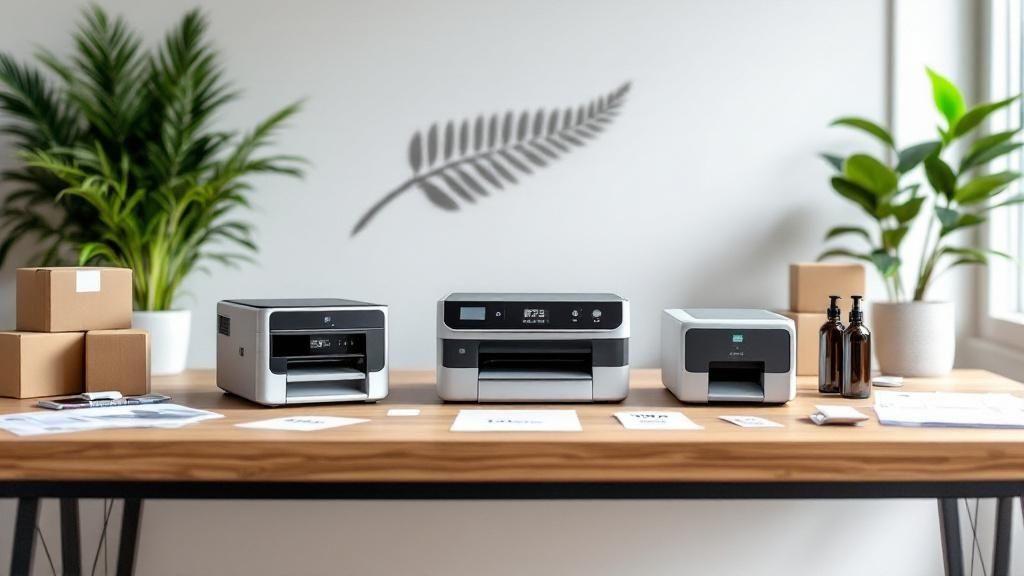
On the hunt for the best label maker NZ has on offer? The perfect choice really comes down to what you need it for, whether you're organising a small retail shop in Wellington or running a massive warehouse in Auckland. A good label maker is a surprisingly powerful tool for making any Kiwi business look more professional and run a whole lot smoother.
Your Guide to Choosing the Right Label Maker in NZ
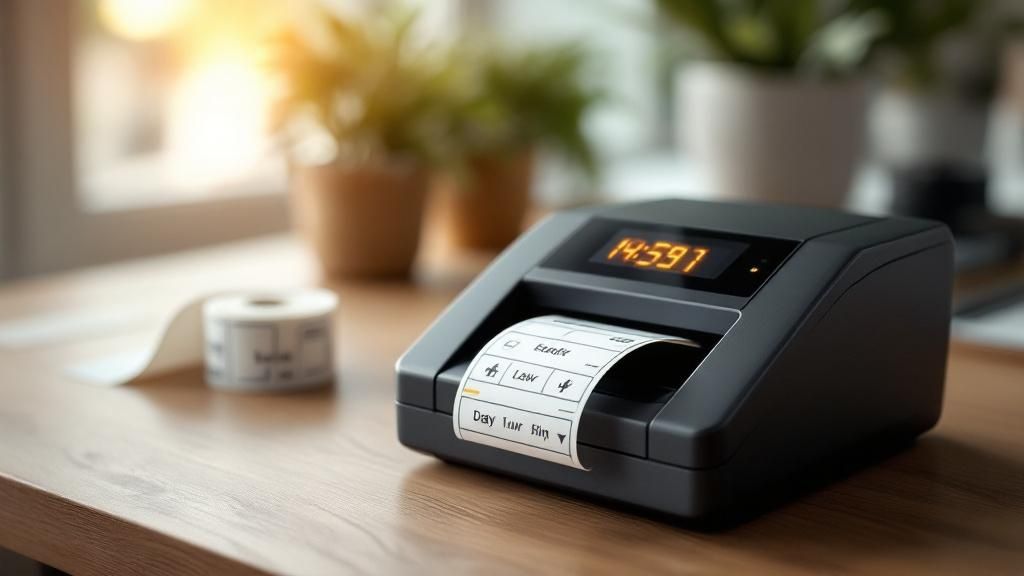
Picking the right label maker can feel a bit overwhelming, but it doesn't need to be. We've put this guide together to cut through the noise for New Zealand businesses, giving you the essential info you need to choose with confidence.
Think of it this way: a label maker isn't just another office gadget. It's a smart investment in your day-to-day workflow.
From getting your files in order to slapping professional-looking labels on products, the uses are endless. A proper labelling system gives you a level of consistency and clarity that a scribbled note just can't compete with. This guide will walk you through everything you need to know.
We’ll cover:
- The different kinds of label makers out there
- Key features that can give your productivity a real boost
- How different NZ industries get the most out of smart labelling
- Tips for picking the right tape and supplies
Our goal is simple: to give you a clear roadmap for figuring out exactly what you need. For businesses keen on optimising their whole setup, it's also worth checking out additional resources for small businesses for more great tips. By the time you're done here, you’ll be ready to pick a tool that starts paying for itself right away.
Understanding the Different Types of Label Makers
Picking the right label maker for your New Zealand business is a lot like choosing the right tool for a job. You wouldn't use a handsaw to fell a massive kauri tree, and you wouldn't bring a chainsaw to trim a hedge. Every tool has its purpose, and knowing the difference is the key to a smart investment.
It’s the exact same story with label makers. They aren't one-size-fits-all gadgets; they fall into a few distinct categories, each built for different settings, workloads, and tasks. Once you get a feel for the main types, you can easily match a machine's strengths to what you actually do day-to-day, making sure you get the right mix of power, portability, and performance.
Handheld Label Makers: The Pocket Knife
Think of a handheld label maker as the pocket knife of the labelling world. It’s compact, portable, and brilliant for quick, on-the-spot jobs. These little guys are perfect for organising office files, slapping labels on shelves in a small retail stockroom, or figuring out that mess of cables behind your desk.
Their biggest drawcard is pure convenience. You can carry them anywhere, from the front counter to the back warehouse, which is ideal for busy places where you need to make a label right then and there. They might not have all the bells and whistles of bigger models, but for many small Kiwi businesses, that simplicity is exactly what's needed.
Desktop Label Makers: The Workshop Bench
If a handheld is a pocket knife, then a desktop label maker is your trusty workshop bench. It's a stationary powerhouse built for higher-volume and more detailed labelling jobs. These units almost always connect to a computer, letting you design and print professional-quality labels with dedicated software.
This is the sweet spot for a huge number of New Zealand businesses. We're talking retail stores that need to print their own barcodes and price tags, or busy offices churning out shipping labels and asset tags for all their equipment.
The real game-changer is the computer connectivity. It unlocks a whole new level of customisation. You can add your company logo, play with different fonts, and even automatically generate sequential numbers or barcodes – a massive plus for inventory control and slick branding.
Desktop models are a serious step up from handhelds in print quality, speed, and the variety of labels you can use.
Industrial Label Makers: The Heavy Machinery
Finally, we get to the industrial label makers—the heavy machinery of the labelling universe. These units are built like tanks to handle the toughest conditions you’ll find in warehouses, on construction sites, and across manufacturing floors in NZ. They’re engineered for pure durability, with rugged casings that can take a drop and shrug off dust and moisture.
Industrial models print on incredibly tough materials made to withstand extreme temperatures, chemicals, and UV light. They're absolutely essential for creating safety warnings, pipe markers, and asset tags that need to last for years in harsh environments. They're a bigger investment, for sure, but their rock-solid reliability is non-negotiable for safety, compliance, and smooth operations.
This image really helps visualise where each type of label maker shines in different business environments.
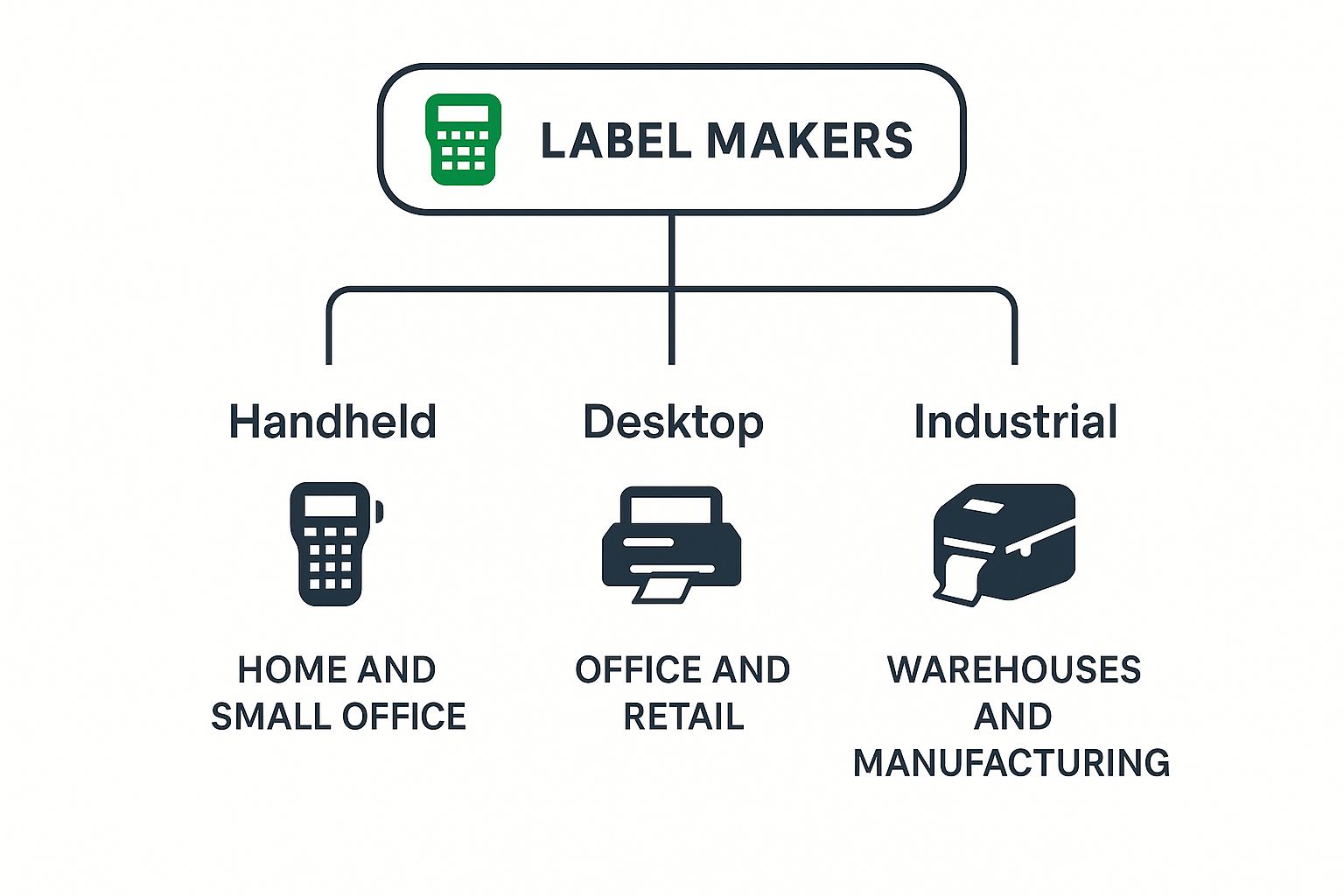
As you can see, the right choice really comes down to the scale of your operation, from simple office organisation all the way up to high-volume industrial work.
To make it even clearer, here’s a quick breakdown of how these three types stack up against each other for a typical Kiwi business.
Comparing Label Maker Types for NZ Businesses
| Label Maker Type | Best For | Typical Price Range (NZD) | Key Features |
|---|---|---|---|
| Handheld | Quick, on-the-go tasks, office organisation, small stockrooms, cable management. | $50 - $250 | Portable, lightweight, battery-operated, simple interface. |
| Desktop | Shipping labels, barcodes, product pricing, asset tagging, professional mail-outs. | $150 - $600 | PC/Mac connectivity, design software, high-resolution printing, wider label options. |
| Industrial | Warehousing, construction sites, manufacturing, outdoor use, chemical exposure. | $400 - $1,500+ | Rugged/durable build, prints on vinyl/polyester, withstands harsh conditions. |
Ultimately, whether you need a simple handheld for odd jobs or a robust industrial machine for the factory floor, understanding these core differences ensures you're putting your money in the right place.
Key Features That Boost Business Productivity
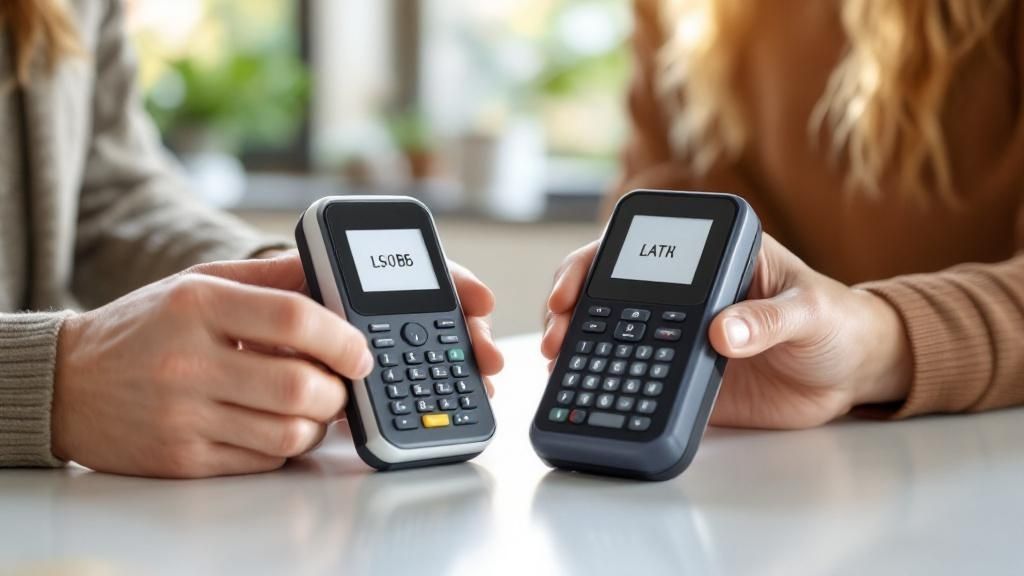
A modern label maker is far more than just a gadget that spits out sticky words. The best ones are packed with clever features designed to solve genuine business headaches and claw back precious time. Getting your head around these features is the secret to picking a machine that becomes a real workhorse, not just another piece of office clutter.
For many Kiwi business owners, the first hurdle is choosing the right printing technology. This decision has a direct knock-on effect on your label's durability and running costs, so it’s worth getting right from the start.
Direct Thermal vs Thermal Transfer Printing
The two main players here are direct thermal and thermal transfer, and they're built for completely different jobs. Think of direct thermal printing like the receipts you get from the supermarket; the printer uses a heated printhead to activate special, heat-sensitive paper, which darkens to create the image. There's no ink, toner, or ribbon involved, making it a brilliantly simple and cheap option to run.
This makes it a perfect fit for any labels that don't need to last forever.
- Shipping Labels: Fantastic for courier labels that only need to survive a trip across the country.
- Visitor Badges: A low-cost, effective way to print temporary ID badges.
- Receipts: The go-to for quick and easy point-of-sale printing.
The catch? Direct thermal labels are sensitive to heat and light. They will fade over time and can be easily scuffed or damaged. For anything that needs to stick around, you’ll need something a bit tougher.
That’s where thermal transfer printing steps in. This method uses a heated printhead to melt a wax or resin ribbon directly onto the label itself. The result is a crisp, incredibly durable print that’s built to last. It’s the difference between writing with a pencil and engraving in stone.
This method is the industry standard for any application where labels must stay readable for months or years, often in tough environments. It's the clear winner for asset tags, product barcodes, and compliance labels that need to withstand heavy handling, sunlight, and moisture.
Connectivity and Software Integration
How your label maker talks to your other devices is just as crucial as how it prints. Sure, a basic handheld model is fine for odd jobs, but for a busy business, connectivity is a game-changer. Models with Wi-Fi or Bluetooth let your whole team print from their computers, tablets, or phones without being physically plugged into the machine.
This kind of flexibility is a massive efficiency win for any shared workspace, whether it’s a retail shop floor or a bustling warehouse. It means a team member can design a label on their PC in the back office and send it straight to the printer on the packing bench.
Of course, the software is the brain of the operation. Good design software lets you go way beyond basic text to create professional, custom labels. Key features to look out for include:
- Barcode and QR Code Generation: Absolutely essential for inventory management and retail products.
- Logo and Image Importing: Helps you get your branding onto every product and package.
- Database Integration: Lets you connect a spreadsheet and print hundreds of unique labels in one go.
Practical Features That Make a Difference
Finally, a few practical design choices can make or break the user experience. An automatic cutter is a huge time-saver, cleanly slicing each label as it's printed—a non-negotiable for high-volume jobs.
Print resolution, measured in dots per inch (dpi), dictates the clarity of the print. While 203 dpi is perfectly fine for most shipping labels, you'll want 300 dpi or more for small text, intricate logos, or high-density barcodes. Label size versatility is also key; you want a machine that can handle everything from tiny folder labels to wide courier stickers.
To get the most out of your investment, think about how your new labelling system fits into your wider business process improvement methods to really lift your team's overall productivity.
Where NZ Industries Get the Most Out of Smart Labelling
A quality label maker isn't just a handy gadget for keeping the office tidy; it's a genuine workhorse that boosts efficiency across all sorts of New Zealand industries. Think about it – from a busy café in Christchurch to a massive logistics hub in Auckland, the right label makes everything clearer, faster, and more accurate. It’s about creating order out of chaos, and that directly impacts the bottom line.
Nowhere is this more obvious than in our booming e-commerce and retail sectors. For any online store, a good desktop label maker NZ businesses trust is the beating heart of the dispatch process. Being able to print sharp, scannable shipping labels on the spot gets rid of handwriting mistakes, makes packing a breeze, and ensures parcels actually get to the right Kiwi customers on time.
In a brick-and-mortar shop, the advantages are just as clear.
- Pricing and Promos: You can quickly print off professional-looking price tags or bright "On Sale!" stickers that catch a customer's eye.
- Stock Management: Slapping a barcode label on new arrivals makes inventory checks faster and way more accurate than ticking off a list.
- Backroom Organisation: When shelves in the stockroom are clearly labelled, staff can find what they need in seconds, not minutes.
A well-run system isn't just about looking neat. It’s about making every single task smoother. When a customer is waiting at the counter, grabbing an item quickly can make or break their experience and keeps the whole shop running like clockwork.
A Must-Have for Manufacturing and Logistics
In the tough, fast-paced worlds of manufacturing and logistics, you simply can't afford miscommunication. Here, an industrial label maker isn't just useful—it's essential for safety, tracking, and keeping processes tight. On a factory floor, durable labels are used to identify machine parts, follow components down the assembly line, and post critical safety warnings that won't peel off even when exposed to oil or heat.
Warehouses run on the very same need for precision. Clear labels on aisles and bins are the backbone of any decent stock management system. They guide pickers straight to the right products, slashing errors and getting orders out the door faster. This level of organisation is absolutely vital for any business juggling a complex supply chain.
The growing demand for solid labelling solutions is clear in the market data. The New Zealand label printing machine market has been growing steadily, pushed by huge demand from our food, beverage, and manufacturing sectors. You can dive into the details in the full report on New Zealand's label printing market trends. It just goes to show how central these tools have become.
On the Tools: For Kiwi Tradies and Hospitality Pros
The benefits don't stop there. For tradies like sparkies and plumbers, a portable, tough-as-nails label maker is a godsend. It's perfect for identifying tools in the van, labelling wires in a switchboard, or marking pipes behind a wall. These hardy labels ensure safety and make any future maintenance jobs a whole lot simpler.
Over in the hospitality world, especially in a commercial kitchen, labelling is all about food safety. Chefs and their teams use labels to mark ingredient containers, track use-by dates on prepped food, and stay on the right side of health regulations. It's a simple habit that prevents waste, cuts down the risk of foodborne illness, and keeps the whole operation looking professional. In every one of these cases, the right label maker proves it's a smart investment in running a better business.
Choosing the Right Labels and Supplies
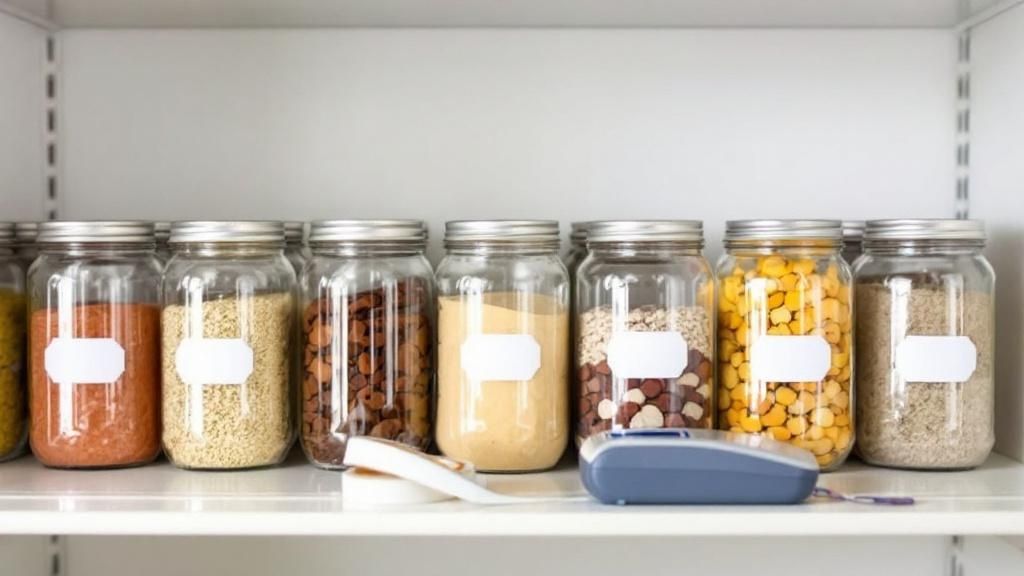
Getting a quality label maker is a great first step, but the machine is only half the story. The real magic happens with the labels and tapes you use—they're what ultimately dictate the quality, durability, and professional finish of your work.
Think of it like putting budget tyres on a performance car; you just won't get the performance you paid for. Using the wrong tape can lead to peeling, fading, and a generally shoddy look that reflects poorly on your business.
A simple paper label might be fine for an office folder, but it will disintegrate in minutes on a toolbox rattling around in the back of a ute. This is why it’s so critical to match your label material to its environment.
Matching Label Materials to Your Task
First things first, you need to think about where your label will end up. Different materials are built to handle different challenges, from moisture and sunlight to chemicals and rough handling.
- Paper Labels: These are your everyday, cost-effective workhorses. They're perfect for general indoor jobs like shipping labels, file folders, or temporary price tags where you don't need a long-term solution.
- Polyester Labels: When you need a label that can take a beating, polyester is your go-to. This tough, synthetic material stands up to moisture, tearing, and most chemicals, making it ideal for asset tags on electronics or permanent safety warnings.
- Vinyl Labels: For anything that lives outdoors, vinyl is the champion. It’s flexible, weather-proof, and excellent at resisting UV fading, so it's the top choice for vehicle signage, outdoor equipment labels, or anything that has to survive the classic New Zealand four-seasons-in-one-day.
It's worth remembering that the state of your label says a lot about your brand. A faded, peeling label can scream "low quality," while a crisp, durable one reinforces a sense of professionalism and care.
Specialty Labels for Unique Jobs
Sometimes, a standard label just won't cut it. Many Kiwi businesses have specific operational or compliance needs that call for something a bit more specialised. The best label maker NZ suppliers will stock a huge variety of tapes to cover these unique situations.
For electricians and IT pros, heat-shrink tubes are an absolute game-changer. You can print directly onto these sleeves, and with a bit of heat, they shrink down to create a snug, permanent identifier for cables and wires. For security purposes, tamper-evident tapes are brilliant; if anyone tries to peel one off, it leaves a "VOID" pattern behind, making it perfect for sealing sensitive packages or electronics.
One final word of advice: always, always double-check that the supplies you’re buying are compatible with your specific label maker. Forcing the wrong tape through your machine is a fast track to poor prints, frustrating jams, and potentially a damaged printhead. Getting the right supplies is what turns a simple label maker into a powerful business tool.
Alright, you've waded through the options, and now it’s decision time. Choosing the right label maker nz businesses can rely on feels like a big step, but it really doesn't need to be a headache. Armed with the right questions, you can pick a tool that slides right into your workflow and actually makes your life easier.
Let's run through a final pre-flight check. This is all about making sure the machine you choose is a perfect fit for what you actually do, not just what looks good on the box. A little bit of thought now saves you from buying a fancy paperweight that gathers dust in the corner.
Core Considerations Before You Buy
First things first, get a clear picture of what you need this machine to do day in and day out. This is the single most important part of getting it right.
- What's your printing volume? Be honest here. Are you printing a handful of labels for office files each week, or are you churning out hundreds for shipping every single day? A simple desktop model is fine for light use, but high volume demands a faster, more rugged workhorse.
- Where will it live? A quiet office environment is one thing, but a busy workshop or dusty warehouse is another story entirely. If your workspace is tough, you need a machine that’s built to handle it.
- What are you printing? Think about the content. Is it just simple text for manila folders, or do you need crisp barcodes, company logos, and detailed product info? This will dictate the print resolution and software features you can't live without.
The need for smart, efficient labelling isn't going away. In fact, projections show that the smart label market in New Zealand is on track for steady growth right through to 2031. It just goes to show how essential these tools are becoming for businesses of all stripes. You can get a deeper look into the New Zealand smart label market projections to see the trends for yourself.
Budget and Buying in NZ
Finally, let's talk money. It's about balancing the upfront cost with what you'll need down the track.
Don't forget to factor in the ongoing cost of supplies. Tapes, ribbons, and label rolls are part of the total investment. Sometimes, a slightly pricier machine with more affordable consumables is the smarter financial move in the long run.
When you're ready to make a purchase, you've got plenty of good options here in New Zealand. Popping into a local retailer like Warehouse Stationery or OfficeMax is great because you can actually see and handle the models. On the other hand, online suppliers often have a much wider range and can be more competitive on price, especially if you need specialised gear or want to buy supplies in bulk.
Work through these points, and you'll be in a fantastic position to buy the perfect label maker for your business.
Got Questions About Label Makers? We've Got Answers
Stepping into the world of label makers can feel a bit overwhelming, and it’s natural to have a few questions. To help you find the perfect machine for your NZ business, we've tackled some of the most common queries we hear.
Think of this as a quick chat with an expert to clear up any confusion, so you can feel confident you're making the right choice.
What’s the Difference Between Direct Thermal and Thermal Transfer?
This is a big one, and it really comes down to how long you need your labels to last.
A direct thermal printer works by heating special, chemically treated paper. The heat creates the text and images directly on the label itself—no ink, no toner, no ribbons. It’s a simple and cost-effective method, perfect for things that have a short lifespan, like shipping labels or receipts.
On the other hand, a thermal transfer printer uses a heated printhead to melt a wax or resin ribbon onto the label's surface. This process creates an incredibly tough, long-lasting print that can stand up to sunlight, moisture, and abrasion. It’s the go-to for permanent applications like asset tags, compliance labels, or high-end product branding.
Here's a simple way to think about it: a direct thermal label is like a supermarket receipt that fades over time. A thermal transfer label is like a professionally printed sign built to withstand the elements for years.
Can Any Label Maker Print Barcodes and QR Codes?
Not necessarily, so this is a crucial point to check. While most modern desktop and industrial label makers are built for business and come with software for generating barcodes and QR codes, it's definitely not a standard feature on many basic handheld models.
If barcodes are a non-negotiable for your inventory or sales process, you must verify that the specific model you’re looking at can handle them. Double-check that it supports the exact barcode types your business relies on before you make a purchase.
Where’s the Best Place to Buy Supplies in New Zealand?
For standard tapes and cartridges, you can pop into major office supply stores across New Zealand, like Warehouse Stationery or OfficeMax. They're great for grabbing what you need quickly.
However, if you're after more specialised or industrial-grade labels, online suppliers are often your best bet for a wider selection. Shopping online can also save you a bit of money, especially if you're buying in bulk. Just be absolutely sure the supplies you order are compatible with your specific label maker nz model. Using the wrong stuff can cause dodgy prints or even damage your machine.
Ready to create stunning, professional labels that tell your brand's story? At SONI DESIGN, we specialise in turning your vision into vibrant reality. Let's create something extraordinary together. Visit us today to get started!
Leave a Comment
Stay home & get your daily
needs from our shop
Start You'r Daily Shopping with Nest Mart
Best prices & offers
Orders $50 or more
Free delivery
24/7 amazing services
Great daily deal
When you sign up
Wide assortment
Mega Discounts
Easy returns
Within 30 days
